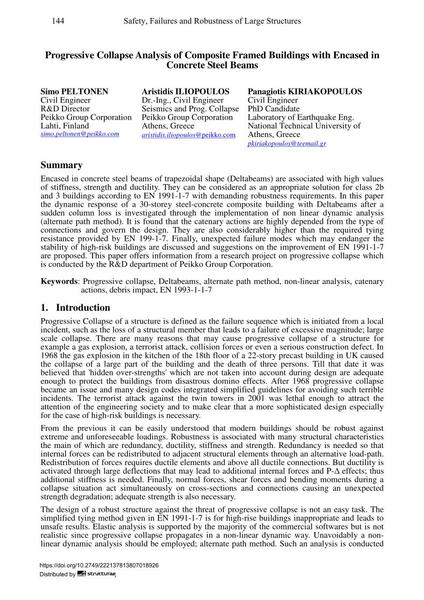Progressive Collapse Analysis of Composite Framed Buildings with Encased in Concrete Steel Beams

|
|
|||||||||||
Bibliografische Angaben
| Autor(en): |
Simo Peltonen
Aristidis Iliopoulos Panagiotis Kiriakopoulos |
||||
|---|---|---|---|---|---|
| Medium: | Tagungsbeitrag | ||||
| Sprache(n): | Englisch | ||||
| Tagung: | IABSE Workshop: Safety, Failures and Robustness of Large Structures, Helsinki, Finland, 14-15 February 2013 | ||||
| Veröffentlicht in: | IABSE Workshop, 14-15 February 2013, Helsinki | ||||
|
|||||
| Seite(n): | 144-151 | ||||
| Anzahl der Seiten (im PDF): | 8 | ||||
| Jahr: | 2013 | ||||
| DOI: | 10.2749/222137813807018926 | ||||
| Abstrakt: |
Encased in concrete steel beams of trapezoidal shape (Deltabeams) are associated with high values of stiffness, strength and ductility. They can be considered as an appropriate solution for class 2b and 3 buildings according to EN 1991-1-7 with demanding robustness requirements. In this paper the dynamic response of a 30-storey steel-concrete composite building with Deltabeams after a sudden column loss is investigated through the implementation of non linear dynamic analysis (alternate path method). It is found that the catenary actions are highly depended from the type of connections and govern the design. They are also considerably higher than the required tying resistance provided by EN 199-1-7. Finally, unexpected failure modes which may endanger the stability of high-risk buildings are discussed and suggestions on the improvement of EN 1991-1-7 are proposed. This paper offers information from a research project on progressive collapse which is conducted by the R&D department of Peikko Group Corporation. |
||||
| Stichwörter: |
progressiver Kollaps nichtlineare Analyse
|
||||
